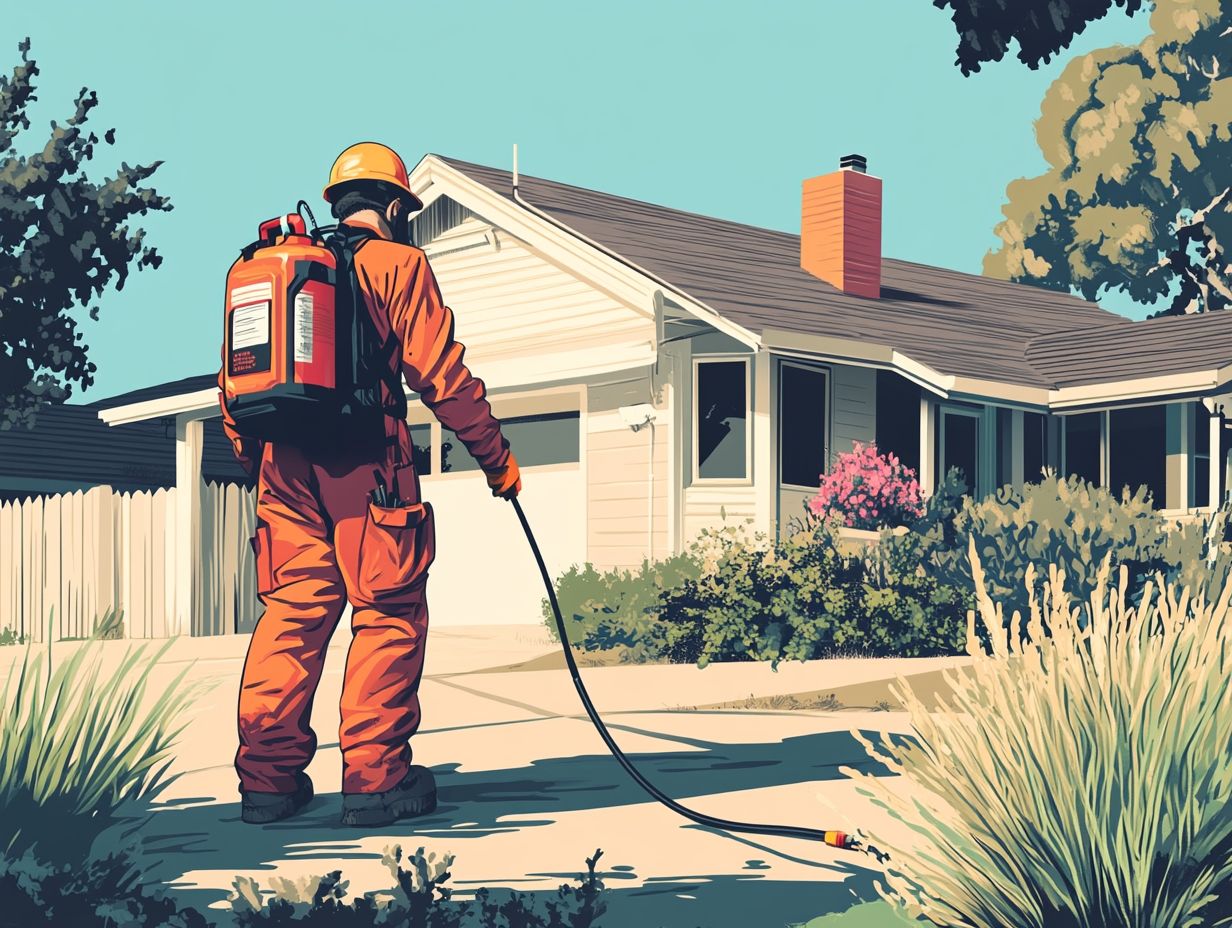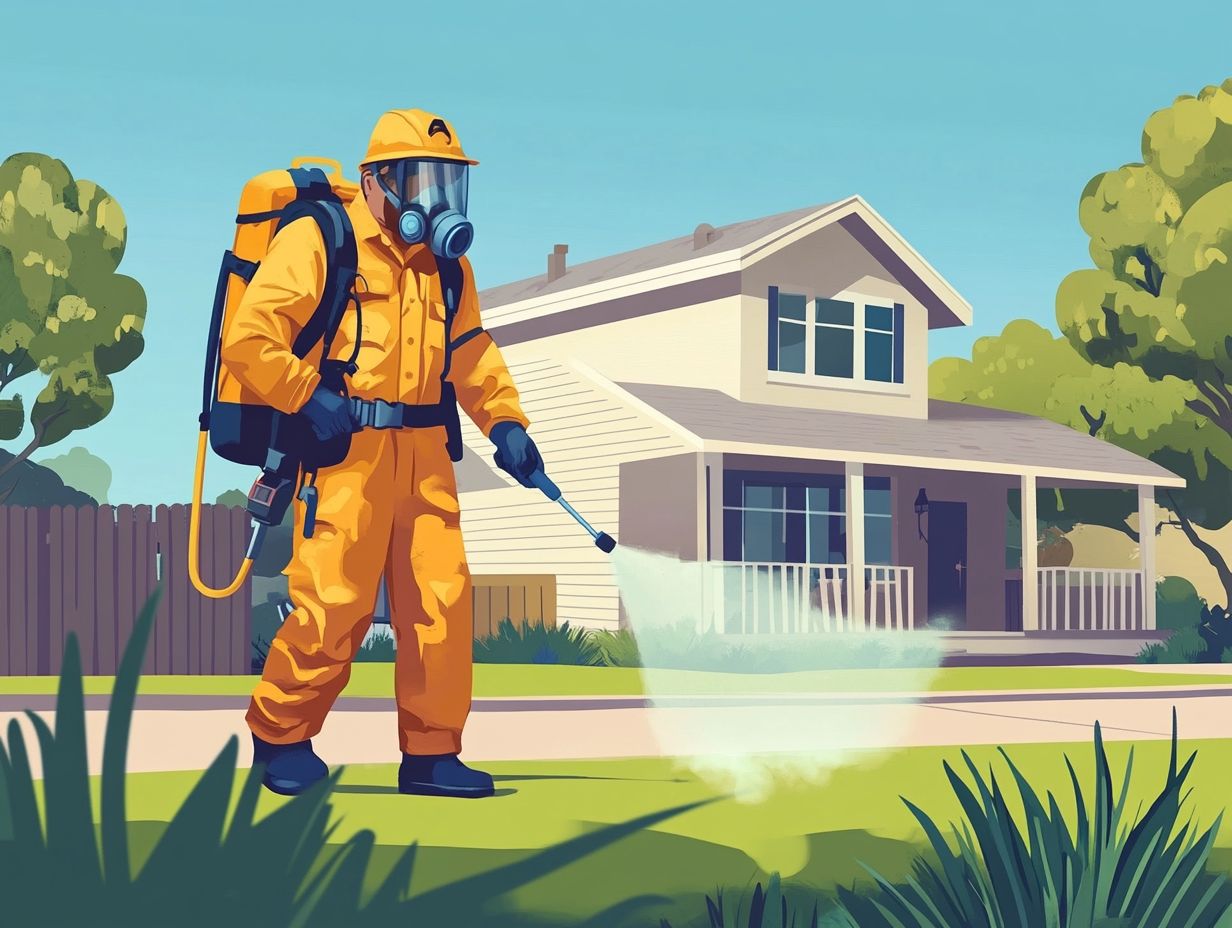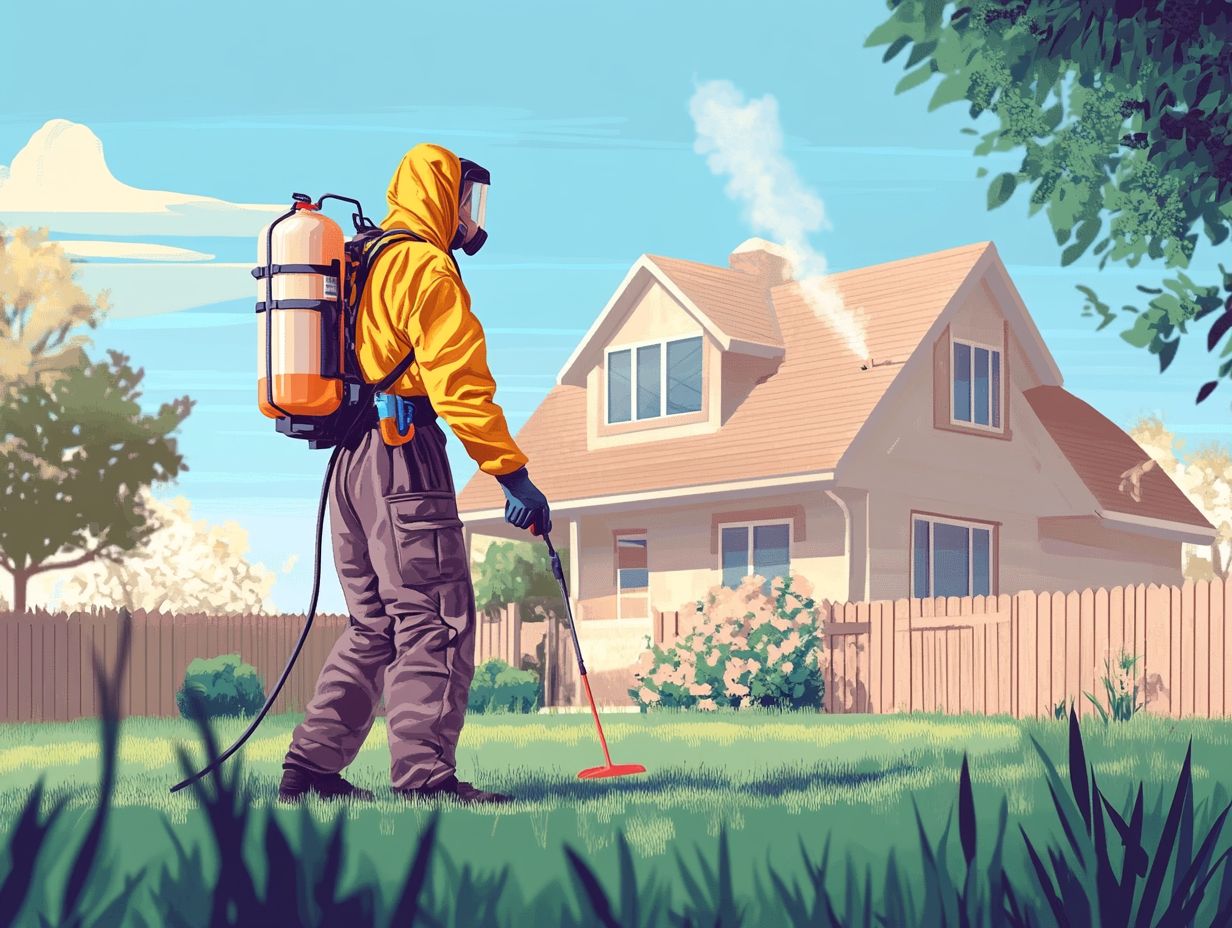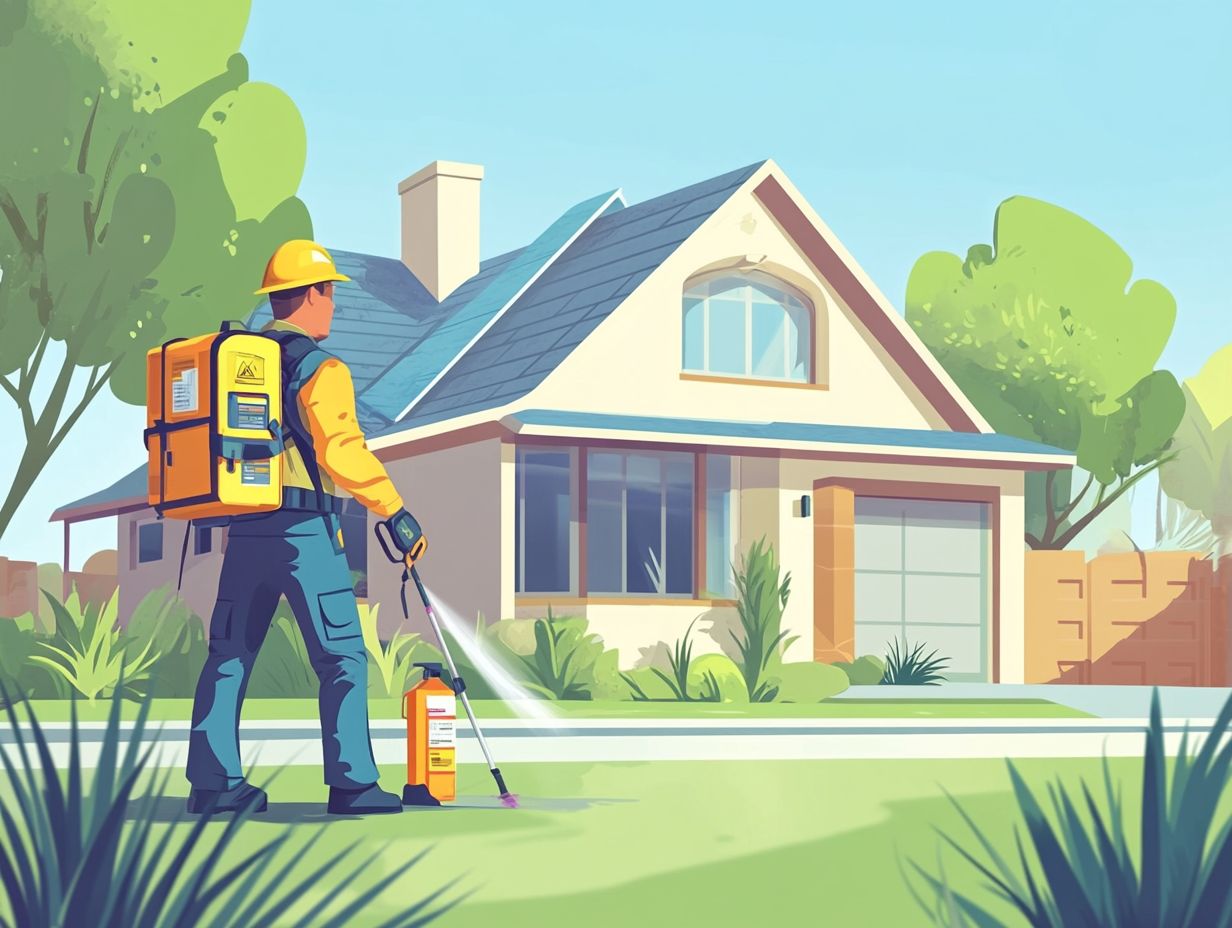The pest control industry is a dynamic and essential sector that plays a crucial role in keeping your homes and businesses safe from unwanted pests.
As the market continues to expand, it’s increasingly important for you to understand its current state, the key players involved, and the range of services available. This article dives into everything from the different types of pest control services to the safety regulations that govern the industry.
We’ll also tackle the challenges that pest control professionals face, like the environmental impact and the growing resistance to pesticides. Plus, we’ll look ahead at the future of pest control, highlighting advancements in technology and the shift towards more eco-friendly practices.
So, buckle up as we navigate through these pressing topics and uncover what lies ahead for this vital industry.
Current State of the Pest Control Industry

The current state of the pest control industry shows some impressive growth, fueled by your increasing need for effective pest management solutions for both urban and agricultural pests.
With pests like rodents, insects, termites, and bed bugs becoming more of a nuisance, companies are stepping up their game to better serve both residential and commercial clients.
The market is evolving, focusing on sustainable practices, integrated pest management (IPM), and eco-friendly pest control products that fit right in with regulations and safety standards.
Market Size and Growth
The pest control market is on the rise, and you’ll want to pay attention because it’s become a multi-billion dollar industry. This growth is fueled by a heightened awareness of pest management and prevention techniques among both consumers and businesses.
Experts predict that the market size will soar to over $30 billion by 2027, with a compound annual growth rate (CAGR) of about 5%. What's driving this demand? Well, urbanization and climate change are leading to more pest infestations, which definitely gets people looking for pest control services. Plus, as you become more aware of the health risks pests can pose, it’s no surprise that there’s a growing acceptance of various pest management solutions.
Simultaneously, there’s a noticeable trend towards organic and eco-friendly pest control methods. More and more consumers are opting for sustainable practices, so if you’re environmentally conscious, you’re certainly not alone in this shift!
Key Players in the Industry
Key players in the pest control industry include major companies that offer a range of services, from residential pest control to fumigation and inspections. They often employ certified pest control technicians to ensure effective management of those pesky critters.
Among these companies, you'll notice that Terminix, Orkin, and Rentokil really dominate the market, collectively holding a hefty share of the industry revenue. Each one brings something unique to the table; for example, Orkin focuses on research-based methods, while Terminix utilizes advanced technology for customized solutions. This competitive landscape pushes everyone to innovate and step up their game.
Pest control associations also play a crucial role in the industry. They set the standards and certifications that pest control professionals must follow, promoting reliability and boosting consumer trust in these essential services.
Common Pest Control Services
In terms of pest control, you'll find a range of services designed to tackle the specific needs of both homes and businesses. Whether you're dealing with pesky rodents, insect outbreaks, termites, or even those annoying nuisance wildlife, there are solutions out there to help you get everything back under control.
Residential Pest Control
Residential pest control services are all about helping you create a customized plan to keep your home safe from those pesky household pests like ants, termites, and bed bugs.
These services not only help you spot any existing infestations but also stress the importance of regular pest inspections. By taking a proactive approach and checking for signs of pests, you can tackle potential issues before they turn into full-blown invasions. Customized pest management plans are tailored to meet the specific needs of your property, making sure those vulnerable spots are monitored and treated properly.
On top of professional help, you can take some preventive measures yourself, like keeping things tidy, sealing up entry points, and using natural repellents to seriously cut down on the chances of unwanted guests crashing at your place.
This comprehensive approach to residential pest control highlights just how crucial it is to stay vigilant and manage things proactively to keep your home environment safe and sound.
Commercial Pest Control
Commercial pest control services are a must for you if you want to keep your business safe and pest-free. Different industries, like restaurants, hotels, and warehouses, face unique pest challenges that these services can help tackle.
These services are specifically designed to meet your sector's needs. For instance, a restaurant might need stricter pest control measures because of food safety regulations, while a warehouse might focus more on prevention strategies to keep inventory safe from damage. Regular inspections and creating tailored pest management plans are crucial to make sure you’re in line with health and safety standards.
It's essential to understand local regulations since you'll need to follow strict guidelines about pesticides and pest eradication methods. By doing this, you not only protect your business's reputation but also reassure your customers that their health and safety are top priorities.
Termite Control

Termite control is one of those critical services you just can't overlook. It involves thorough pest inspections to spot any signs of infestation and implementing effective treatment options to protect your property from costly damage.
Recognizing the urgency of dealing with termite issues early can really make a difference—it's often the gap between a simple treatment and extensive repairs. You've got a variety of treatment methods at your disposal, from traditional chemical solutions that target the pests directly to more organic pest control options that use environmentally friendly substances to keep those wood-destroying insects at bay.
Regular inspections are essential for maintaining your property’s integrity. They help catch any potential threats before they snowball into much larger problems. By being proactive, you can save your home from the destructive impact of termites and keep everything in tip-top shape.
Bed Bug Control
Bed bug control has become super important lately, especially since infestations are on the rise. You need effective pest management strategies and some innovative pest control products to tackle these tough little pests.
As these sneaky insects keep adapting and thriving in all sorts of environments, they throw some serious challenges your way. Their knack for hiding in tiny spaces, breeding like it’s going out of style, and surviving without a meal for ages makes it tricky to get rid of them.
Plus, with the rise of pesticide resistance, it’s clear that you need to explore new approaches and keep up with ongoing research in pest management.
Getting to know the biology of these pesky bugs can really help you out in making effective control measures. It also shines a light on how crucial preventive strategies and regular monitoring are to stay one step ahead in the battle against infestations.
Rodent Control
Rodent control is a key part of pest management that focuses on identifying, monitoring, and getting rid of rodent populations in both homes and businesses.
In terms of effective rodent control techniques, it often starts with traps and barriers designed to keep these sneaky little intruders at bay. You have options ranging from snap traps to more humane choices, depending on what you feel comfortable with and your ethical stance.
Don’t overlook barriers, either! Caulking gaps and sealing entry points are essential steps to limit their access. Plus, getting to know rodent behavior is super important. By observing them, you can pinpoint active areas, nesting sites, and their favorite food sources.
By keeping an eye on their activities, you can take proactive measures to avoid potential infestations and maintain a more sustainable approach to pest management.
Safety and Regulations in the Pest Control Industry
Safety and regulations in the pest control industry are super important for protecting both your health and the environment. These guidelines help pest control companies use pesticides and other products legally and responsibly.
It’s all about making sure you and the planet stay safe while tackling those pesky pests.
Environmental Impact
The environmental impact of pesticides is becoming a big concern for many people, pushing the pest control industry to explore eco-friendly options and sustainable practices to reduce harm to non-target species and ecosystems.
This shift isn’t just a passing trend; it’s a necessity. The negative effects of chemical pesticides on soil health, water systems, and biodiversity are gaining more attention. Traditional methods often create pesticide-resistant pests, which means you end up needing to use even stronger chemicals. This cycle isn’t just bad for the environment; it’s not great for public health either.
In response to these challenges, many practitioners are turning to integrated pest management (IPM) strategies. These methods include using biological controls, manipulating habitats, and utilizing natural repellents. This holistic approach not only helps protect ecosystems but also encourages a healthier relationship between people and their environment, showing that there’s a growing awareness of the need for sustainable solutions.
Health and Safety Regulations
Health and safety regulations in the pest control industry make sure that you, as a pest control technician, are trained and equipped to handle pesticides safely. This protects both you and the public from any potential hazards.
These regulations are really important for creating a safe working environment. They cover all sorts of protocols about how to store, apply, and dispose of those harmful substances. It's essential for you to engage in ongoing education; this not only keeps you in the loop on the latest safety standards and pest control methods but also deepens your understanding of environmental impacts.
Continuous training is key to preventing accidents and making sure you’re compliant with government regulations, which ultimately helps the well-being of your community. By making education and safety measures a priority, you enhance your effectiveness and responsibility in your crucial role.
Challenges and Controversies in the Pest Control Industry

The pest control industry has a few challenges you should be aware of, like the ongoing debates about using chemicals and pesticides, the risk of pests developing resistance, and the potential impact on non-target species.
These issues really call for some careful thought and innovative solutions.
Use of Chemicals and Pesticides
The use of chemicals and pesticides in pest control has definitely stirred up some controversy. Many people are concerned about their safety and environmental impact, which has led a bunch of pest control companies to look for alternative pest management strategies.
You might find that these companies rely on those substances because they’re really effective at quickly getting rid of pests that threaten crops, homes, and public health. But let’s be real—there are downsides. There are potential health risks for humans and wildlife, not to mention the long-term damage they can cause to ecosystems.
Because of these concerns, the industry is increasingly focusing on developing safer alternatives, like integrated pest management and organic solutions. These options aim to reduce risks while still keeping pests at bay. Plus, strict pest control regulations are super important in guiding these efforts, making sure companies stick to safety standards and think about the broader impacts of what they do.
Resistance to Pesticides
Pest resistance to commonly used pesticides is becoming a real headache for pest control professionals, which means it’s time for ongoing pest management research and some innovative monitoring techniques to tackle this issue.
This evolving situation is coming from a mix of factors, like over-reliance on certain pesticide classes, environmental pressures, and the way pests are adapting biologically. As pests get tougher against conventional treatments, the impacts on agricultural productivity and public health are pretty significant.
Pest control specialists are now diving into integrated pest management (IPM) strategies that focus on diversity, biological controls, and rotating pest control agents. Research initiatives are also looking into genetic solutions, such as biopesticides and genetically modified organisms, while keeping an eye on the ecological impacts of these methods.
All these advancements aim to create sustainable pest management systems that not only cut down on resistance but also protect the environment.
Impact on Non-target Species
The impact of pest control practices on non-target species is something you definitely want to keep an eye on. When pesticides are applied, the unintended consequences can really disrupt local ecosystems and biodiversity.
Take neonicotinoids, for example. Studies have shown that their widespread use is linked to a decline in pollinator populations like bees and butterflies. These little guys are crucial for plant reproduction and food production, so losing them is a big deal. You might also notice that many bird species have seen their populations drop because of pesticide ingestion. This not only affects their survival but also the health of entire ecosystems that rely on these birds for pest regulation.
Given these concerns, there's a pressing need for eco-friendly pest control methods. You want to manage pest populations without putting non-target species at risk. Sustainable practices, such as integrated pest management (IPM) or using biocontrol agents, can help reduce those negative impacts and promote a healthier balance in our precious ecosystems.
Future of the Pest Control Industry
The future of the pest control industry seems pretty bright for you. With all the advancements in technology and an increasing focus on eco-friendly pest control methods, you can expect solutions that prioritize safety and sustainability.
It's an exciting time to be involved in this field!
Advancements in Technology
Advancements in technology are shaking up the pest control industry in a big way. You’ll see innovations in pest monitoring systems, pest control software, and equipment that make pest management services more efficient and effective.
For instance, smart traps are now using sensors and artificial intelligence to detect and monitor pest activity in real time. This means you get faster response times and improved accuracy. Drones are also game changers; they make it super easy for inspectors to scout hard-to-reach areas and provide aerial images that give a clearer picture of pest infestations.
Modern software solutions are there to help you plan and execute pest control strategies like a pro. With data-driven decision-making, you can minimize chemical use while maximizing results. All these technologies work together to streamline service delivery and boost client satisfaction by providing more effective and targeted treatments.
Shift towards Eco-friendly Methods

The shift towards eco-friendly pest control methods shows that more and more people like you are looking for sustainable solutions that are easy on the environment and your health.
As awareness of ecological issues grows, many pest control companies are stepping up to meet your needs by adding organic options to their services. These methods often make use of natural predators, essential oils, and other non-toxic substances, giving you a safer choice for both your home and the planet.
By embracing these sustainable practices, pest control professionals can tackle your pest problems while also committing to a greater cause of environmental stewardship. This transition is crucial for shaping the future of pest management, as it helps create a healthier ecosystem and improves the effectiveness and safety of pest control strategies.
Frequently Asked Questions
What is the Pest Control Industry?
The Pest Control Industry refers to businesses and professionals that specialize in the management and elimination of pests such as insects, rodents, and other unwanted animals from homes, buildings, and other structures.
What types of pests does the Pest Control Industry deal with?
The Pest Control Industry deals with a wide range of pests, including but not limited to ants, termites, cockroaches, bed bugs, rodents, and wildlife animals such as raccoons and squirrels.
How does the Pest Control Industry control and eliminate pests?
The Pest Control Industry uses various methods and techniques to control and eliminate pests, which may include chemical treatments, physical barriers, traps, and exclusion methods. These methods are chosen based on the type of pest and the severity of the infestation.
Are the products used by the Pest Control Industry safe?
Yes, the products used by the Pest Control Industry are safe when used correctly and according to the manufacturer's instructions. Pest control professionals are trained to handle and apply these products safely and effectively.
Is the Pest Control Industry regulated?
Yes, the Pest Control Industry is regulated by government agencies and licensing bodies to ensure that proper procedures and safety standards are followed. It is important to hire a licensed and experienced pest control professional for effective and safe pest management.
What are some benefits of hiring a professional Pest Control Industry?
Some benefits of hiring a professional Pest Control Industry include customized and effective treatment plans, use of safe and environmentally-friendly products, and long-term solutions for pest prevention. Professionals also have the knowledge and experience to identify and eliminate pests that may be difficult for homeowners to handle on their own.

